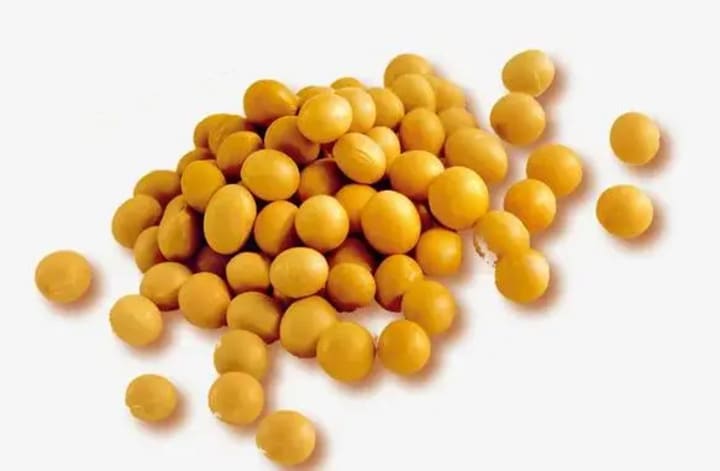
Soybeans are a food that we often eat, and it is loved by the common people because of their high nutritional value. Especially in the morning, many people like to use soybeans to grind a cup of soy milk to drink, which is good.
The seemingly insignificant soya beans contain a lot of nutrients, and if you often eat soya bean products the body is extremely effective. But some people think that if you have liver disease, you can't eat soybeans, is this true? You may want to learn more about this.
01
About soybeans
[Soybean nutritional composition]
Soybeans have the highest nutritional value among legumes. It contains 40% protein and is rich in fat content of up to 25%. Soybeans contain more protein than beef, calcium content is higher than milk. Lecithin content is higher than eggs but also rich in minerals, and vitamins.
Every 100 grams of soybeans contains 10.2 grams of water, 36.3 grams of protein, 18.4 grams of fat, 25.3 grams of carbohydrates, 4.8 mg of crude fiber, 367 mg of calcium, 571 mg of phosphorus, and 11 mg of iron.
Also contains carotene 0.4 mg, vitamin B10.79 mg, vitamin B20.25 mg, nicotinic acid 2.1 mg, and available calories 419 kcal.

Soybean efficacy]
1. Prevent blood vessel hardening
Lecithin in soybeans can get rid of cholesterol attached to the walls of blood vessels to prevent the hardening of blood vessels, prevent cardiovascular diseases, and protect the heart. Lecithin in soybeans also has the effect of preventing the accumulation of excess fat in the liver, thus effectively preventing fatty liver caused by obesity.
2. Prevention of Alzheimer's disease
First of all, soybeans contain a relatively high level of soy lecithin, which can lower our blood cholesterol, and also protect our skin and nervous system.
Soy lecithin is good for our nervous system, as it reduces the incidence of Alzheimer's disease and some neurological inflammation.
3. Enhances brain vitality
Soybeans have a high content of soy lecithin, a component essential for brain development. So eating more soy helps prevent Alzheimer's disease and other age-related diseases. In addition, the sterol component of soy lecithin can be very good at improving. In addition, the sterol component of soy lecithin can improve neurological function.
4. Reduce blood lipids and cholesterol
Soy lecithin can promote the absorption of fat-soluble vitamins and make various tissues and organs of the body healthy. The plant sterols in soybean have the effect of lowering blood cholesterol.
It can improve lipid metabolism and prevent diseases such as coronary arteriosclerosis. It will compete with intestinal cholesterol, thus reducing the absorption of cholesterol in the body.
02
Early signs of liver disease?
1. Nausea and anorexia
After the occurrence of liver diseases such as hepatitis, liver cells are damaged, the metabolism and digestion of fats are impaired, detoxification function is reduced, and nausea, vomiting, and loss of appetite are likely to occur when eating. Especially greasy food is more likely to cause nausea.
2. Gum bleeding
If you find that your teeth or nose are bleeding when you wake up in the morning to brush your teeth and wash your face, this is also a sign of liver disease. Gum bleeding occurs mainly in patients with chronic hepatitis, and in patients with severe hepatitis, the amount of bleeding is quite large.
The main reason for bleeding is that after the liver cells are damaged, the coagulation factors in the liver are not as good as before, and eventually, the coagulation function becomes problematic and the gums bleed.
3. Yellowing of urine
In people with liver disease, the metabolism of bilirubin is affected, and once bilirubin is excreted through the urine, the urine will become yellow. In this case, attention should be paid to treatment, when the liver disease situation has improved, the yellow urine situation will also be improved.
03
Can people with liver disease eat soybeans?
The liver is damaged by certain pathogenic factors, causing significant impairment of substance metabolism and reduced detoxification. Soya beans are a vegetable protein vitamin trace elements more exclusively rich food, genus but will produce gas.
Liver disease refers to lesions that occur in the liver, including hepatitis B, hepatitis A, hepatitis C, cirrhosis of the liver, alcoholic liver, and many other liver diseases. And soy contains a large amount of purine base, which will increase the metabolic burden of the liver and kidneys, when the liver organs have serious diseases, pay attention to eating less or do not eat soy.
Therefore, for patients with liver disease, this type of food is not allowed to eat more, because gas production may increase the peristaltic burden of the intestines. But you can have proper energy and supplement vitamins as well as trace elements.

04
Reminder: people with a bad liver, try to eat less 5 kinds of food
1. Tofu milk
Although the taste of tofu milk smells light, eating is very fragrant, many people like it, but very little some people understand the harm of tofu milk on the body. For this special cuisine in the production process, you must first tofu long mold, do not know that after the tofu long mold.
It will cause carcinogenic substances, which are a lot of aflatoxins, often eating tofu milk is very harmful to the body, very easy to let a lot of aflatoxin corrosion the body. To the liver's metabolism leads to heavy pressure, and causes liver disease.
2. pickled vegetables
Pickled vegetables are almost every household must be pickled, pickled time will be put into a large amount of salt to reduce the moisture of vegetables, but also to prevent the vegetables from breaking down.
Many people may feel that eating too many pickles can also cause liver discomfort. This is true, the pickled vegetables into a large amount of edible salt, and salt inside the sodium element, the body will ingest too much liver discomfort.
3. Fatty meat
All kinds of animals will exist fatty meat, we must reduce the intake of fatty meat when eating meat. Because the fat content of fatty meat is very high, if you eat too much may also cause an increase in uric acid levels.
The most important point is that many domestic animals and poultry are now artificially raised. There are many feed toxins inside fatty meat, and it is easy to hurt your health when you eat it.
4. Soaked fungus for too long
Wood fungus is not unfamiliar to anyone, it is a very common and highly nutritious food, which can be used as a side dish in normal times, and also to make soup and stir-fry. However, it should be noted that the soaking time is about 30 minutes.
If the soaking time is too long, harmful substances will be produced in the fungus. Some people will put the long-soaked fungus into the refrigerator to keep it fresh for their next consumption.
In fact, for this fungus, a large amount of consumption can cause damage to the human body. People with a bad liver must avoid eating large amounts to prevent aggravating the liver and inducing liver cirrhosis and other diseases.

5. skin egg
Patients with poor liver function should not eat skin eggs because they are rich in protein, and when the protein is decomposed, a large number of amino acids will be produced. Patients with liver disease are likely to suffer from ammonia poisoning or liver coma because the detoxification function of the liver is affected.
In addition, the eggs need to be mixed with salt, lime, and lead oxide during production, so the eggs made in this way will have more lead elements inside, which will increase the burden on the liver and affect the normal operation of the liver detoxification function if too much is consumed.
About the Creator
CEA
A bird in the hand is worth two in the bush.






Comments
There are no comments for this story
Be the first to respond and start the conversation.